Indie Review Roundup, Part 2
Back with more love for indie games
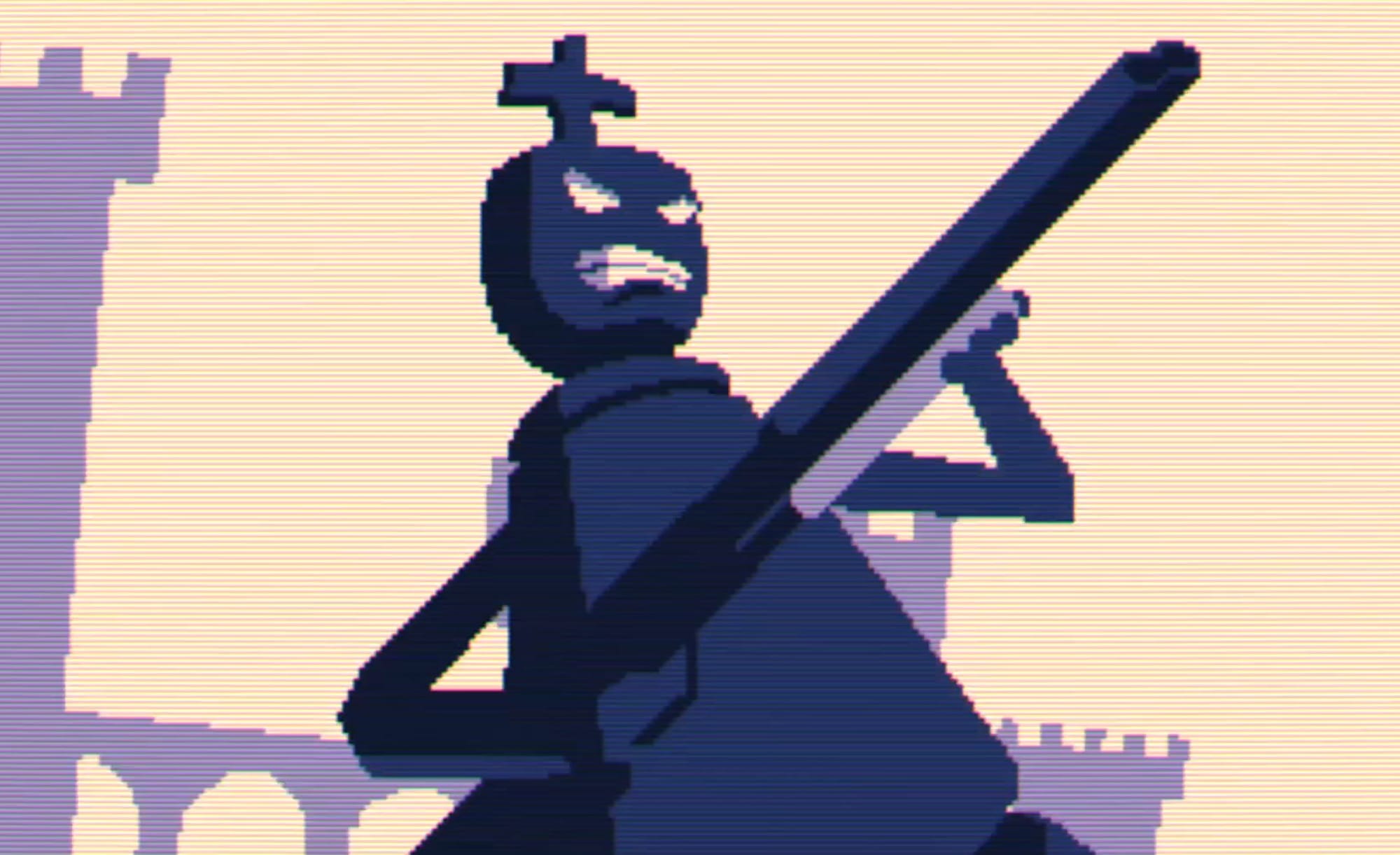
We're back with Part 2 of my roundup of the indie games I've been playing over the last several months! In Part 1, I told you how much I loved Monument Valley, how Rentlord killed an interesting concept with very little depth, and how Click & Conquer's underlying anti-war message really spoke to me. Now we're back with three more indie treasures that I had to tell you about, so let's get right to it!
Tower Wizard
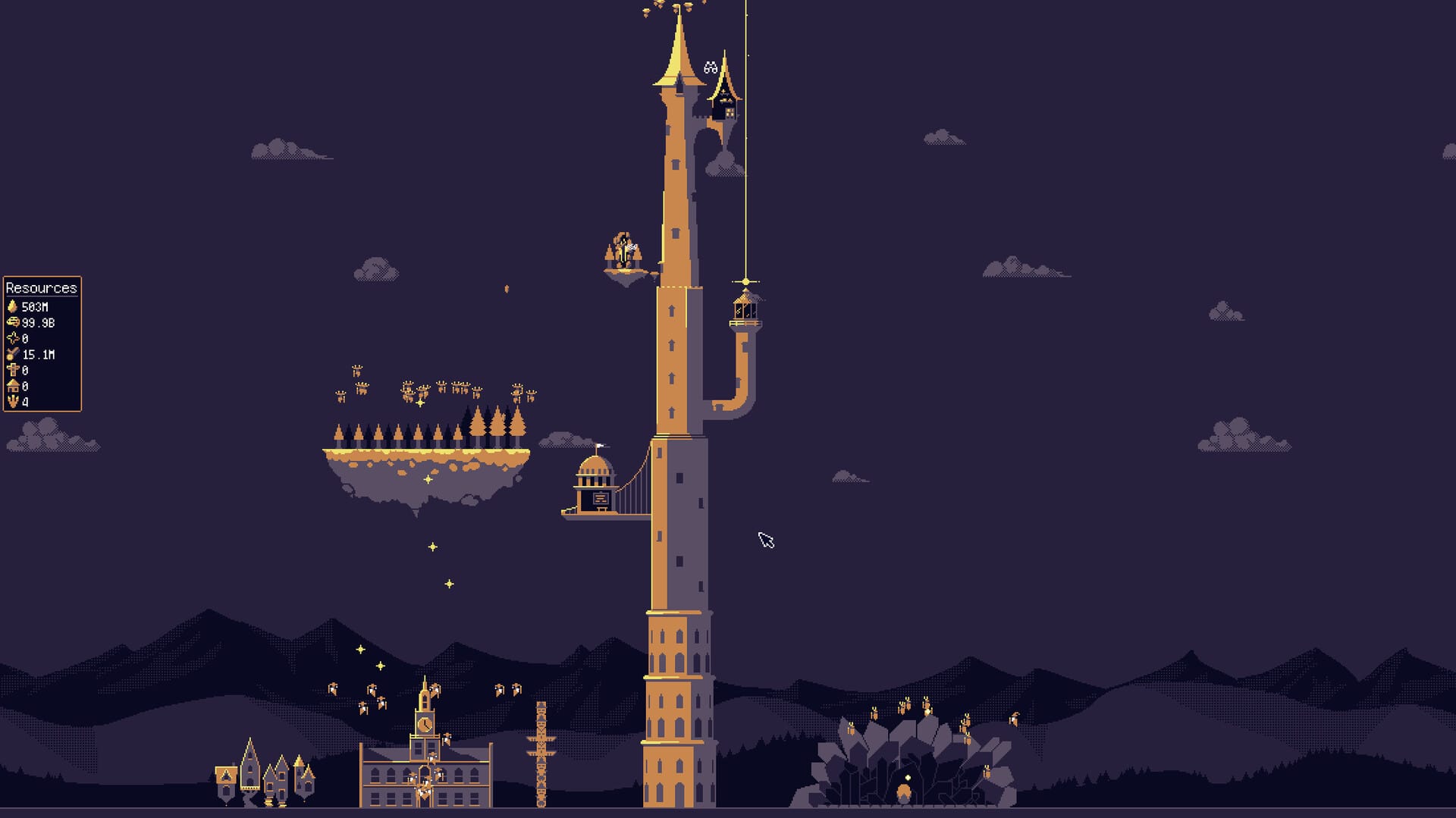
I want to briefly talk about this little game I encountered called Tower Wizard. I’ve really been digging these idle clickers lately. I work from home at my PC primarily, so I am totally okay with checking on these incremental games in the background every so often. Tower Wizard is a really well-made example of the genre, and I’m kind of sad it’s now over; I hit 100% on the achievements, so I’ve effectively beaten it. I wasn’t even looking for an idle clicker, but it was on the store page for me, and I bought it on a whim during the sale. Maybe it was fate.
I think one thing that gets overlooked with these idle clicker games is how well-designed they can be. It’s not something that crosses your mind for games where all you do is click and leave it in the background. In Tower Wizard, your goal is to collect resources and build a tower as tall as possible. You’ll begin the game farming Magic, then Knowledge, and then Wood a bit afterwards. Whenever progress gets slow, much like other idle clickers, you’ll use the Prestige points you’ve earned to invest in permanent upgrades. At certain intervals of the Prestige system, you'll also gain additional passive bonuses for free. I was particularly fond of the ability that increases the output of the last thing you clicked by 80%; it was very useful, and I made thorough use of it throughout the game.
I have to critique this Prestige mechanic a bit, though, because I found it to get really slow in the late-game, around when you’re going to be doing damage to the walls. Maybe that’s by design, but I ended up beating Tower Wizard without getting to the end of the Prestige tree simply because it was so darned slow. I didn’t really see a benefit to Prestiging again after investing a total of 18 points, since I was making relatively good progress by simply leaving the game idle. In a way, I appreciate it not being required, but I also would’ve liked to see what my yields would’ve been like if I hit the end of that tree. You’re often limited by Spirits when it comes to the late-game, and if you don’t optimally place them, Prestiging is worth it merely so you can reset and place them more effectively.
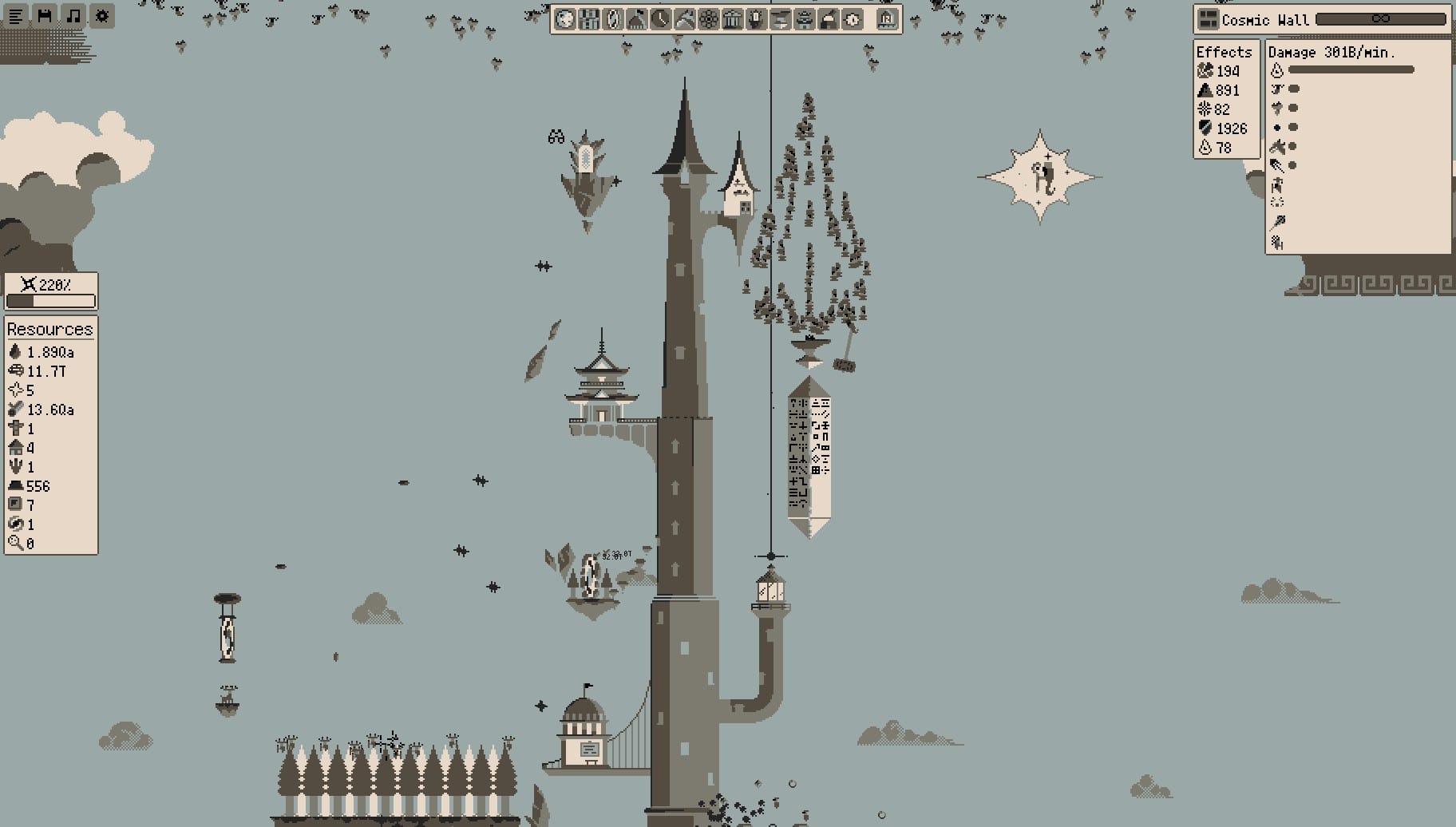
What I love about Tower Wizard is that the game continually introduces new forms of mechanics and resources as you progress. One of the first it’ll throw at you is Alchemy, where you’ll collect Gold and craft different ores or relics with that to provide passive boosts to your yields. Eventually, you’ll hit a wall, both literally and figuratively, which you must destroy. At this point, Damage becomes what you’re focused on. No matter how far you progress, you’ll find that previous additions to the tower remain relevant in some way to the next phase, being endlessly synergetic. At one point, for example, you’ll need to collect cosmic dust, which is accumulated based on the damage you deal, right after the last phase introduced Relics to boost your Damage output much further than by default. It’s brilliant game design for that reason, and it never really feels like a portion of your tower gets completely phased out or irrelevant. They all become parts of a bigger synergistic machine in a really satisfying way.
I have to mention that I love the pixel-art style here. I was particularly fond of the Inverted colors (try it, trust me) since it made the game look like it belonged on the original Game Boy. I wish there was more to say about Tower Wizard, but that’s really it. I’ve summarized it the best I can, and I loved it! It’s a tiny little incremental game with great game design that I hope you love too. I am still pretty sad that it's over because I was having a lot of fun checking on my tower. If you love incremental games and idle clickers, you should 100% pick up Tower Wizard.
Shotgun King: The Final Checkmate
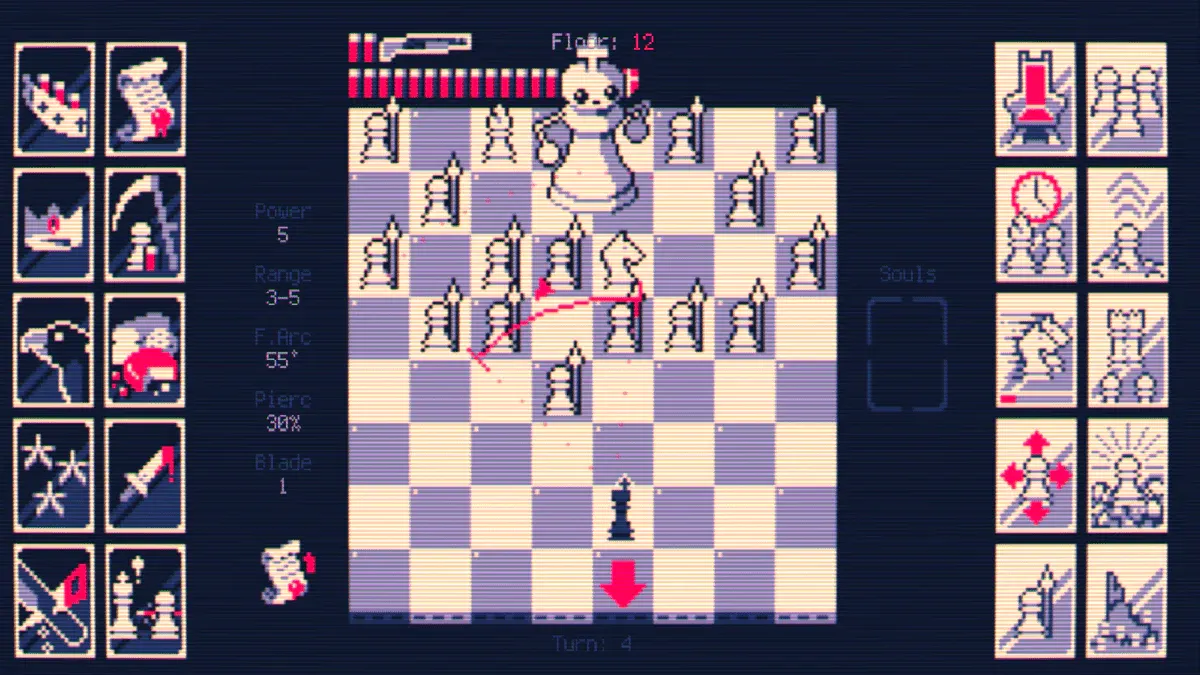
I really love finding little indie games that are quite a novelty to play, and Shotgun King: The Final Checkmate is one of those. It is a tiny, fun little romp of a game that I absolutely find to be a joy to play. It's not a game I can speak on at length due to how small the experience is, though there is depth to be found here for those who enjoy being completionists. I was satisfied with playing enough to win a few runs before setting it down. However, I do see myself going back to this between other games, as is the norm for most roguelikes. Add this to the ranks of the plethora of stellar roguelikes in existence, I suppose.
Shotgun King is pretty hilarious in concept, and its ridiculousness genuinely made me laugh during the tutorial. The king of the black side of your average chess set has become a tyrant in his kingdom. Enraged after being overthrown, he does what any sane individual would do and grabs his trusty shotgun to exact his revenge. The tutorial ends with his loyal bishop resigning after seeing how insane the king has become. The tutorial is great at introducing you to the game’s mechanics in a humorous and enjoyable way, making it easy and quick to wrap your head around.
If you’re a Chess player, you’ll find some familiarity with the strategy aspect of this game. You’re only using the King here, armed with his prized shotgun. The game is turn-based, and each turn, you’ll decide to move or fire off a shot at the enemy pieces on the board. You also need a turn to reload. The goal here is to defeat the enemy King, actually, and you’ll breeze through many stages more easily when you realize this: focus on firing at the King whenever you can. The rounds grow more difficult as you progress, with more pieces being added to the board. By the last round, I was asking myself, “Is that a full chess set?” Moving around on the board will add more bullets in reserve. You’ll lose if your King enters Checkmate and you run out of moves. Even explaining the game’s mechanics kind of drives home how silly this concept feels. That’s what makes it likable, though, and we all need something a little more lighthearted every now and then, don’t we?
The roguelike aspect of the game comes from the cards you select at the end of each round upon defeating the enemy King. You’ll be presented with two pairs of cards that provide a passive boost during the rest of your run. These cards can range from a boost to your firepower, the spread of your firing arc, or other beneficial effects. The catch is that whatever pair you choose, the enemy gets a card to buff them, too. You’ll sometimes find yourself forgoing beneficial cards due to the enemy card they’re paired with being too good. I personally liked playing this game at a slower pace, so I would often skip the “Final Countdown” enemy card, which ends the game after a set amount of turns, even if the card it was paired with would be beneficial to me.
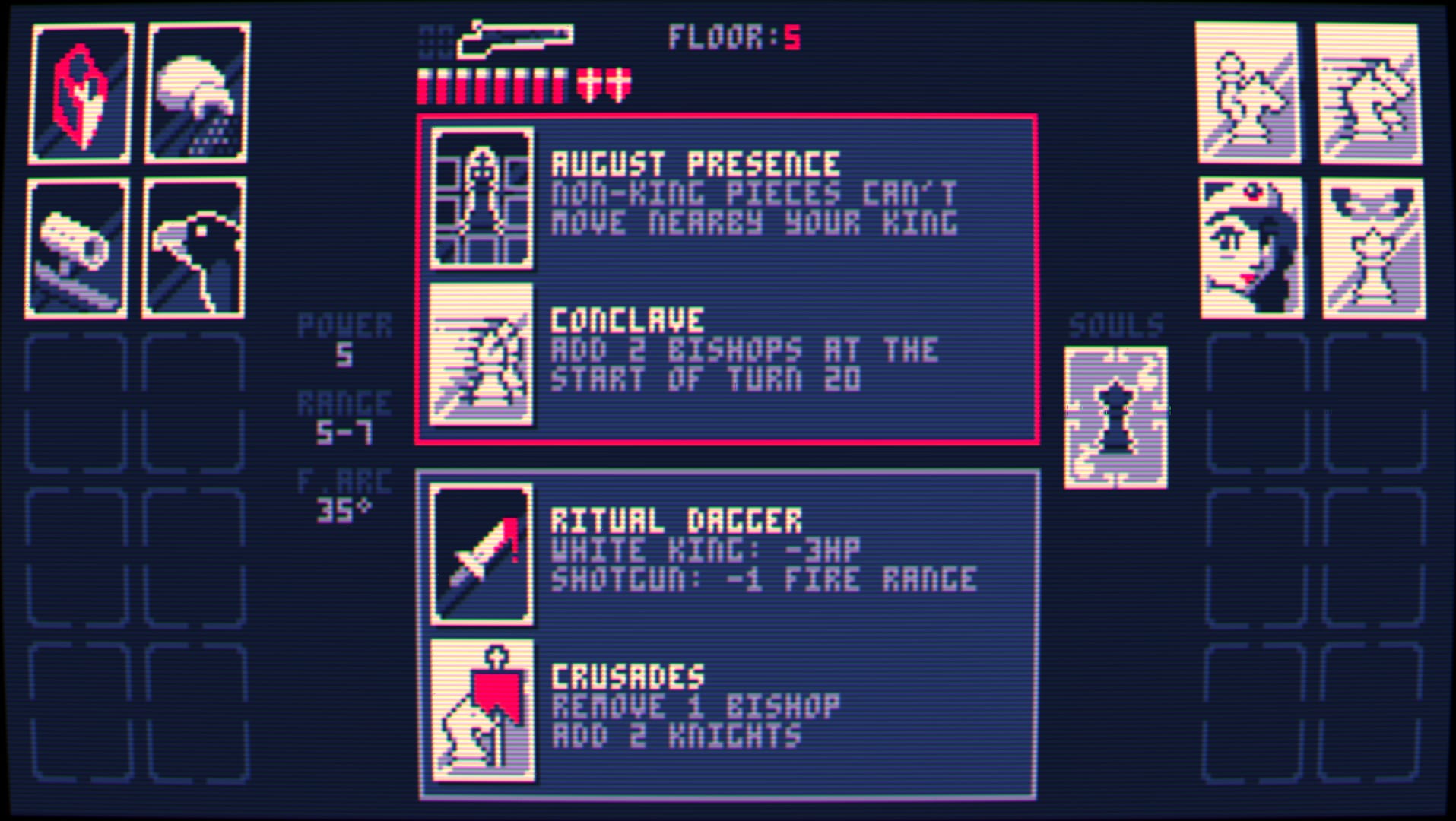
As with many roguelikes, you’ll find yourself preferring specific cards over others based on your own playstyle. I enjoyed being stationary and taking shots downrange as enemies came to me, so I liked the Moat card a lot, which prevented enemies from crossing to your side of the board in one move. Another card slowed Pawns in particular while they were crossing this moat. I really enjoyed this setup, and in general, I love it when you can fine-tune a run around a specific playstyle. I find it very valuable in the genre, as I discussed with Rentlord, that feeling of “Okay, what build am I doing this time” when you see what cards you get is part of what makes roguelikes so addicting. I see that Shotgun King originated from a Game Jam, and I’m definitely impressed with that in mind; the developers really know how to design a game, and they have my utmost respect for that.
I have to say that the price is a bit high at $10, though. Shotgun King has a fair amount of Unlockable content, Achievements, and challenges to complete, but don't think it has enough depth in its core gameplay to really be worthy of such a price. While it is a fun and lighthearted game, it does have the energy of a Flash game; when you hit the end of one of those Flash games, you're not likely to want to keep playing. Shotgun King suffers from a similar problem; merely having content won't give every player a reason to do that content, is what I’m trying to say here.
There’s not enough that is intriguing about a run to really make me want to keep going with it. I don’t know what the solution to this would be, though my mind initially goes to Slay the Spire’s random events. Slay the Spire is a game that is sort of deceptive with its depth; it isn’t really that complex of a game when you look under the hood, but every run still feels fresh and unique. Shotgun King unfortunately gets repetitive faster than you’d really want it to, and tha's what holds it back.
Regardless, I would definitely recommend picking up Shotgun King sometime and messing about with it. I grabbed it on the Steam Summer Sale when it was around five bucks, and that’s pretty well worth it to me for what it offers. If you need a game that’s more on the lighthearted side, something to give you a little brightness in this everlasting storm of life in the 2020s, Shotgun King can do that for you. It put a smile on my face while playing it, and we should place more value on games that can pull off that move.
Hypnospace Outlaw
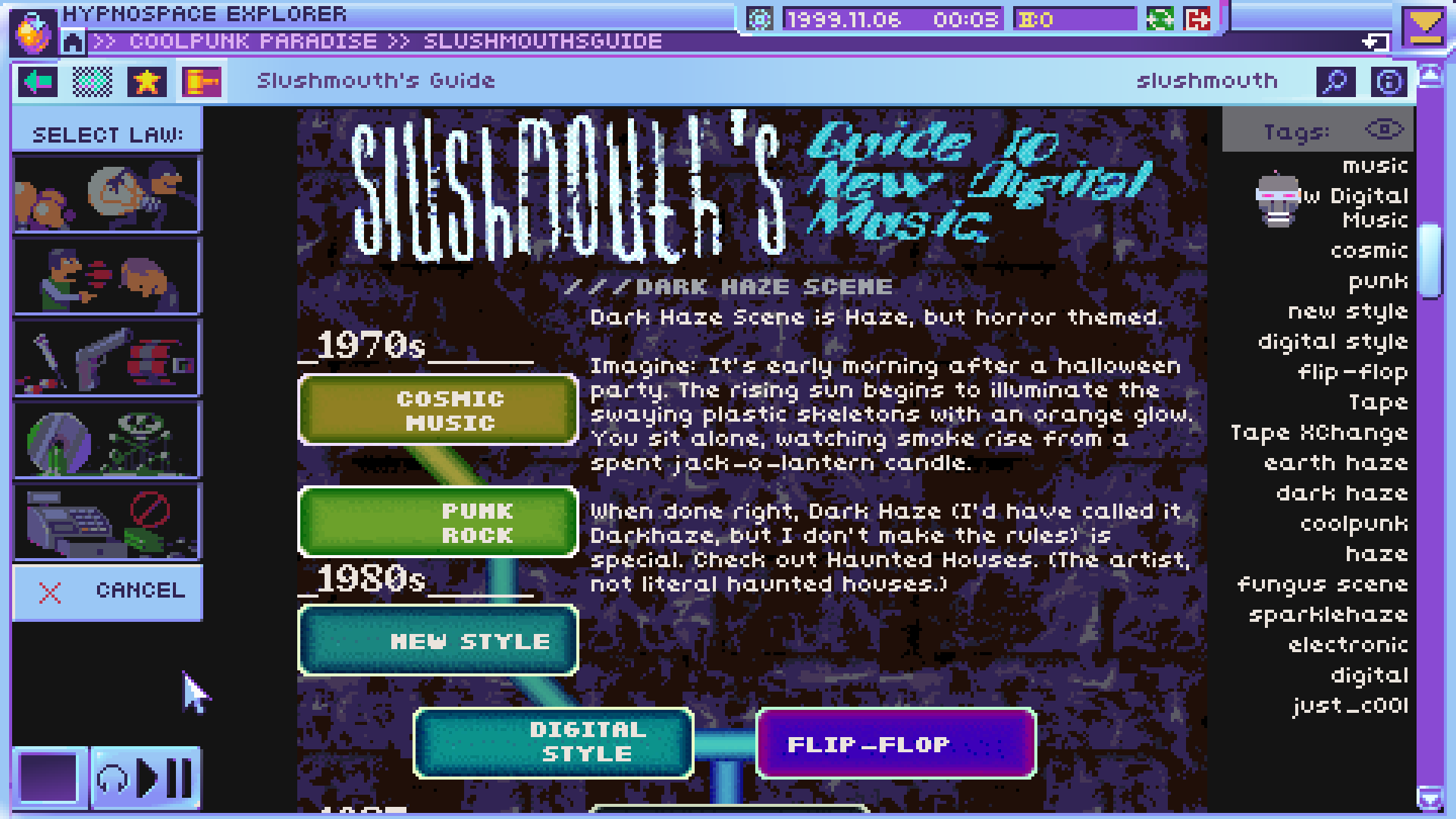
You know, after gaming for a long time, I really value experiences that are just darned weird. There’s really not enough of the weird or surreal in gaming, and that’s a shame. I don’t think any other entertainment medium is as capable of diving into the realm of weirdness that many of us secretly desire. I don’t always want another by-the-numbers open-world game, or another game that festers with dark moments and aura. I want something that is zany, wacky, and goes off the rails a bit. I know many often bring up Kojima’s work when it comes to games that aren’t afraid to get weird, and I’m not saying you’re wrong, but I don’t exactly want that either. I hope that doesn’t come across as a shot at Kojima because that’s not my intention - there’s a certain brand of weirdness that not even Kojima has really delved into that I particularly desire, and Hypnospace Outlaw is the embodiment of that.
Hypnospace Outlaw is an indie game that does its best to emulate the 1990s era of the internet; the time of Geocities, hyperlinks, and expression via your own web pages. I won’t act like I was around for this era, because I wasn’t quite old enough at the time, though I experienced early 2000s internet, which wasn’t much more adanced. From what I can recall of my early days on the web, much of it was spent in forums or IRC chats, but those odd little websites that emanated like a window into a person’s life were still around. I’m sure someone who experienced the internet in this era will be hit much harder by Hypnospace Outlaw’s themes and atmosphere, but I nonetheless found the game to be fantastic.
The game's interface looks like its own desktop operating system, called HypnOS. When you open this game on Steam, it’ll actually open in its own window labeled “HypnOS’. A lot of work was done here to make it authentic. You can change the wallpaper and the color scheme, and even adjust the placement of icons on your desktop. You can buy one of those shady desktop assistants, wallpapers, themes, or even buy virtual pets that will run around on your desktop as well.
HypnOS has its own web browser that you’ll be using extensively through the course of the game’s events, called “Hypnospace Explorer”. As you’d expect while using this custom web browser, you’ll find a sudden injection of nostalgia, as the numerous links to different web pages are all there. I genuinely appreciate that Hypnospace Outlaw does not have any time limit or running clock, for this is a game that deserves to be explored. The attention to detail here to make all of these different web pages feel real, fitting, and authentic is miraculous. You can click on a plethora of links that aren’t even relevant to the main plot and simply see someone’s page advertising a product or writing about their personal fanfiction, or promoting their band’s new song, mundane things you’d expect to see. The game's soundtrack enhances the experience even further, as you’ll hear plenty of music on different pages you visit, just as many individuals would choose custom music for their pages back in the day.
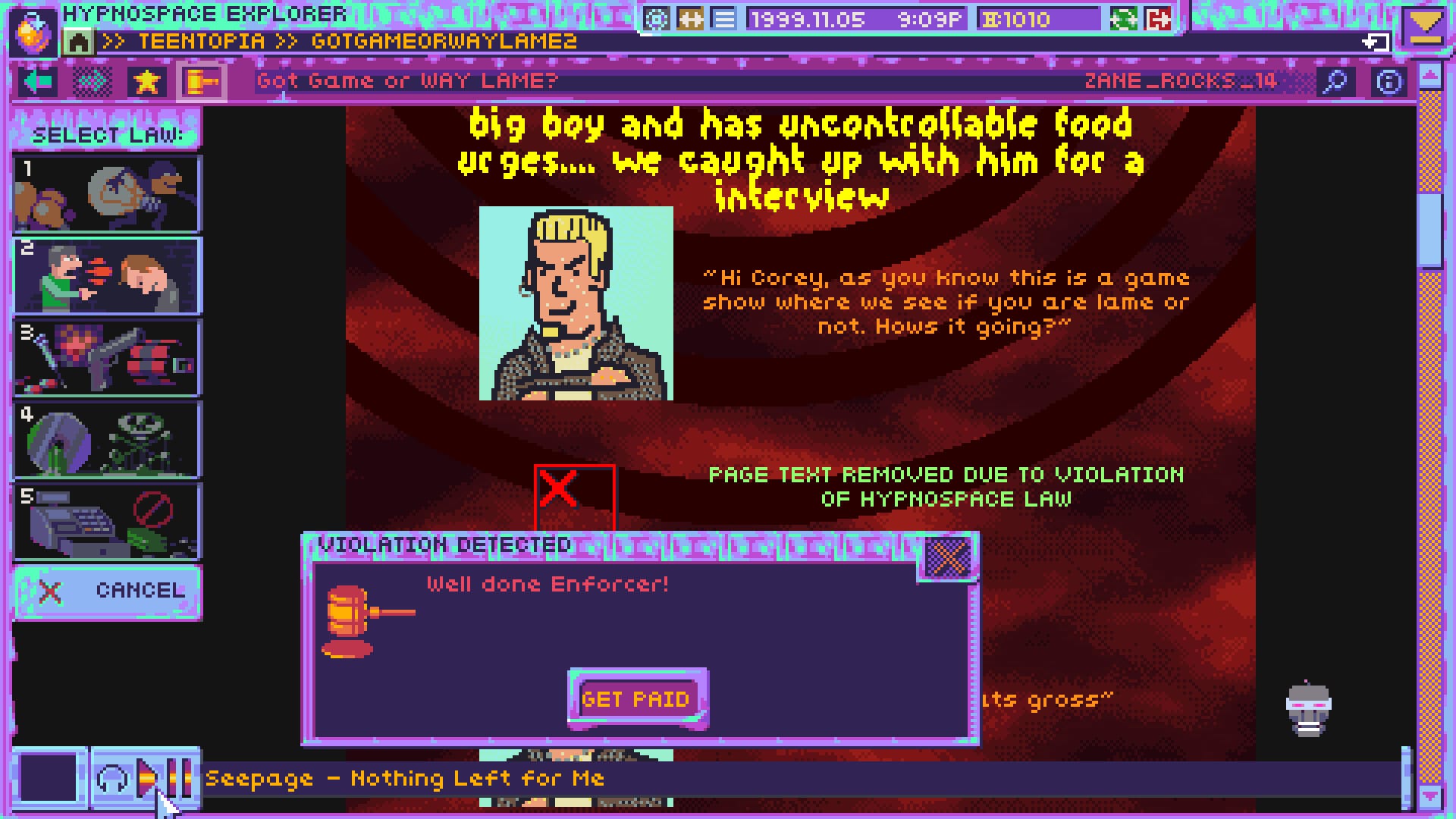
It really invokes a different time and methodology when it comes to the internet, doesn’t it? There was this era of self-expression that we’ve really lost over the years, and it makes me genuinely sad. When you browse Twitter, YouTube, or even BlueSky, everything feels very minimalistic and professional. Everyone’s profile looks exactly the same beyond their avatar and banner image. There’s no real way anymore to truly express yourself or really exude one’s personality from their page alone. Hypnospace Outlaw makes me ask, why have we devolved this far? Where’s our creativity? Where’s our expression? What happened to really being ourselves?Via this emulation of the 90s internet, the game dares to remind you what it’s like to be painfully and utterly, remarkably human. The personal pages of Hypnospace Outlaw make me feel like I know that fictional person more than I do a real person whose online profil I’ve clicked. The more I find myself reflecting on this, the more a pit forms in my stomach, distraught over what we’ve lost. The internet has become significantly more tasteless.
Beyond being a web browser, the moment-to-moment gameplay is actually a puzzle game. You’ll be placed as an Enforcer for “Merchantsoft”, likely a parody of Microsoft in this world, whose job is to police the web. Your duties involve reporting any signs of crime you find online. It’s here that I appreciate the game has a text-to-speech feature. You’ll need to do a lot of reading to absorb what the game wants to tell you, and often having it read to you makes it click, particularly when you’re a person like me who has issues with focus.
The crimes you’ll be looking for can range from copyright infringement, extortion, and scams, to cyberbullying and more nefarious deeds. Quite humorously, one of your first tasks in this game will be to copyright strike images of a retro cartoon character that people are reproducing online - the “offender” in this instance being a poor school teacher lady who is merely a fan of the character. Even the drawings of the character that her students made, which were subsequently posted to the site, are liable for copyright infringement. Sorry, Bethany, Age 7 - your drawing is getting the copyright strike hammer. It’s utterly hilarious and a really fun way to introduce you to the game by making you do something that isn’t really morally correct.
You’re given very vague information to solve the different cases you’re handed. It is up to you to explore the internet and really delve into where you can find the reported violations. Hypnospace Outlaw, as a resul,t becomes a mixture of a mystery and puzzle games, adding to its unique qualities. Beyond merely browsing the web, you’ll also find yourself having to dig up passwords or download programs to really find the solutions to these mysteries. One case in particular had a solution that involved downloading a program and clicking the resulting pop-up ad to be taken to a web page that was only accessible via that pop-up ad, from which I could then report. It is a game that really encourages you to explore and take your time, though I did find myself stuck a few times with very vague clues on how to proceed. Try not to get too frustrated, as you'll eventually find your way through and the juice is definitely worth the squeeze.
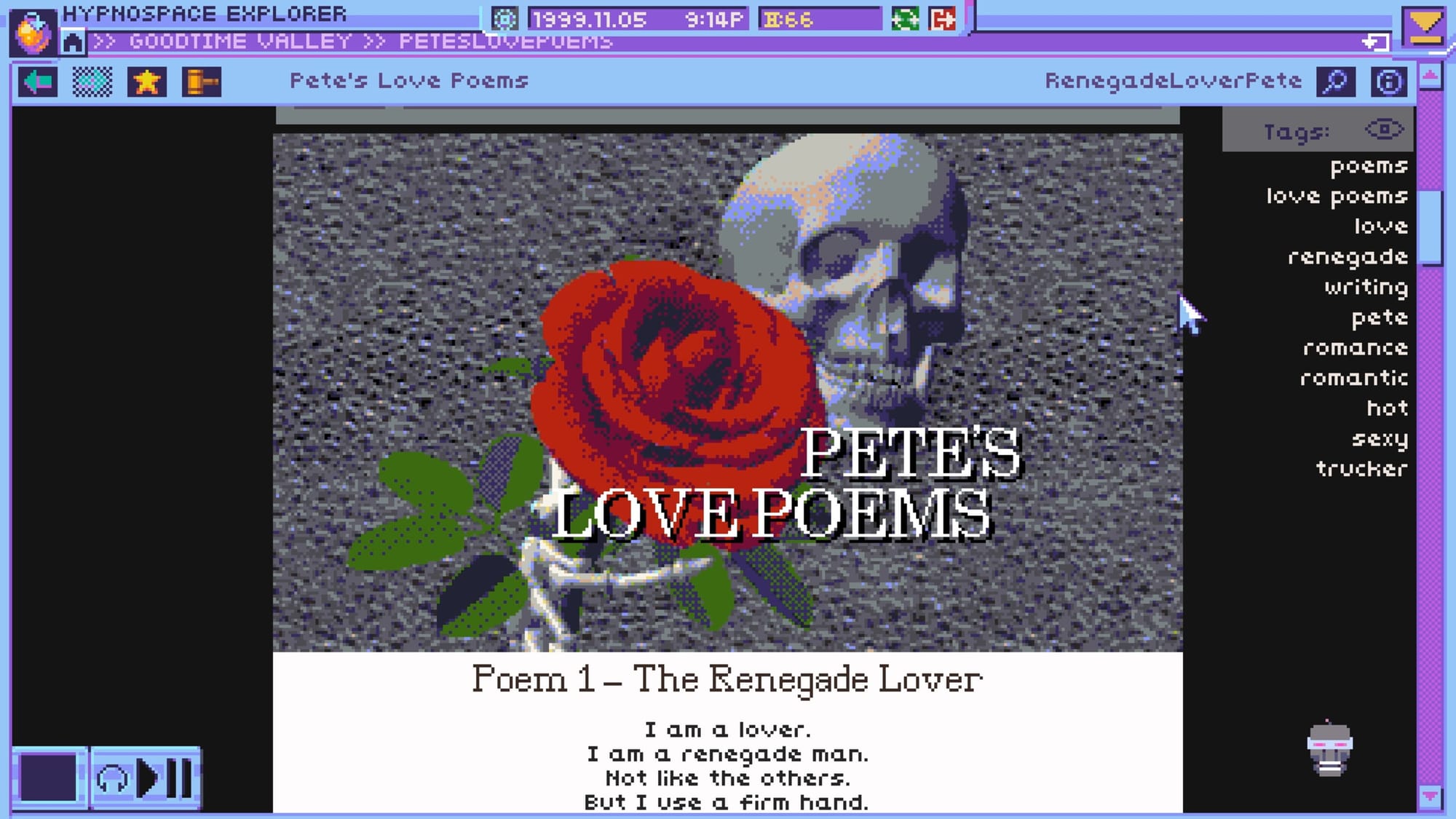
Hypnospace Outlaw is one of the most unique experiences you’ll find in gaming, and it really pains me that I can’t dive into the story side of things here since I need to remain spoiler-free. I have to say that Hypnospace Outlaw really exudes this feeling of being human in a way that is stunningly beautiful. Although my main critique would be with how abruptly the game ends and shifts to its climax, I still adored my time with the game.
This is something to genuinely be cherished. It is not simply a homage to the 90s web. Hypnospace Outlaw is much more than that - it is a masterpiece of a game that reminds you of so much that we take for granted: the self-expression and spontaneity of the early internet; the way the internet has plummeted from a place of color and flavor; the things that seem mundane but make us human and unique.
I’m floored by how creative Hypnospace Outlaw is, and I cannot recommend it enough. I personally had it on my radar for a while, but when Jay Tholen, the man behind this game, announced that the sequel, called Dreamsettler, was cancelled, I was heartbroken to see how devastated he seemed. I hope Jay is doing well, and t him, if he’s possibly reading this, and to all creatives in general - please never stop creating. Your creativity is beautiful, it’s special, and it deserves to be harbored in a way that the world can see. Flex your creativity and let your colors shine.
Hypnospace Outlaw, in many ways, is a depiction and embodiment of what human creativity can be. If you take away anything from this, I want it to be that we don’t get experiences like this if we are afraid to get weird or creative, so what’s stopping you? Fly free and make the art you want people to embrace.
